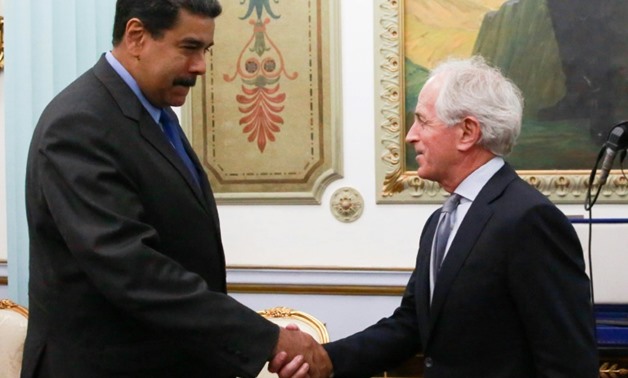
Venezuelan President Nicolas Maduro (L) greets US senator Bob Corker (R) during the latter's visit to the Miraflores presidential palace in Caracas on May 25, 2018
27 May 2018: Venezuela released American Joshua Holt and his wife Saturday after nearly two years in jail, in what its leftist government said was a gesture aimed at fostering dialogue with Washington to avert US "aggressions."
Officials in both countries said the couple were on their way to Washington, where US President Donald Trump said Holt would be received with his family at the White House.
Senator Bob Corker, chairman of the Senate Foreign Relations Committee, met in Caracas Friday with President Nicolas Maduro, paving the way for the release.
Utah Senator Orrin Hatch, who led a two-year effort to win the freedom of Holt and his wife Thamara Caleno, praised Corker's "pivotal efforts."
"Good news about the release of the American hostage from Venezuela," Trump tweeted. "Should be landing in D.C. this evening and be in the White House, with his family, at about 7:00 P.M. The great people of Utah will be very happy!"
Maduro ordered the couple's release as a "gesture" aimed at promoting dialogue between Caracas and Washington, Venezuelan Communications Minister Jorge Rodriguez told reporters in Caracas.
He said it was part of "efforts to maintain a respectful dialogue, diplomatic relations of respect, that permit gates to be opened to avoid the aggressions to which (Venezuela) has been subjected."
He apparently was referring to US sanctions, which Washington has tightened since Maduro was re-elected earlier this month in elections that the US rejected as a "sham."
- Marriage, then arrest -
Holt, a 26-year-old Mormon missionary from Utah, had traveled to Venezuela in June 2016 to marry Thamara, whom he had met on the internet.
Shortly after they married, however, the couple was arrested by the Venezuelan intelligence service Sebin, and accused of possessing weapons and plotting to destabilize the Maduro government.
Top officials in the Socialist regime labeled Holt a US spy. In December, the Justice Ministry decided to bring the couple to trial, and rejected a petition for his conditional release.
Holt and his wife were being held at a prison in Caracas known as the Helicoide where the Sebin keeps political prisoners.
Earlier this month, he surfaced during a protest by opposition activists jailed in the massive hilltop structure, and appealed for US help in a video posted on Twitter.
"I'm calling on the people of America. I need your help to get me out of this place," Holt said in the video.
He also appeared in a photo taken of a group of prisoners inside the detention center.
"As announced by the president, our son and his wife will be released today," read a family statement issued by Holt's lawyer in Venezuela, Carlos Trujillo. "We thank you for your collaboration during this time of anguish we have been through."
The statement expressed gratitude "to everyone who participated in this miracle."
- Sanctions bite -
Holt's release comes as Maduro moves to ease tensions that have spiked since the May 20 elections, which were boycotted by most opposition parties and denounced as illegitimate by the US, EU, Canada and at least a dozen Latin American countries.
The Trump administration tightened financial sanctions on cash-strapped Venezuela after the vote.
The Venezuelan president then retaliated by giving the two top US diplomats in the country 48 hours to leave, accusing them of conspiring against his government.
On Friday, however, human rights monitors reported the release of 20 activists who had been jailed in the western state of Zulia for protesting against the government.
In taking the oath of office on Thursday, Maduro acknowledged that the sanctions are biting.
"I can't deceive anybody, they are going to create grave difficulties, painful difficulties," he said.
"A profound rectification is needed, things have to be done anew and better. We are not doing things well and we have to change this country."
The Venezuelan economy is in shambles, with hyperinflation expected to hit 13,000 percent this year and dire shortages of food that have driven hundreds of thousands of citizens to pour into neighboring Colombia and Brazil.
Maduro has blamed the US for his country's woes, but most economists point to years of destructive policies and corruption as well as a period of plunging oil prices.
Venezuela -- once one of Latin America's most prosperous countries -- has the world's largest oil reserves but oil production has fallen sharply in recent years as corruption, disinvestment and the loss of skilled workers take their toll.


Comments
Leave a Comment